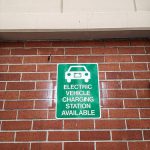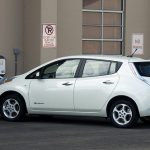Fee set to punish hybrid & EV owners in Wisconsin
A new proposal in Wisconsin would mean that the state would join four other states in effectively punishing electric vehicle owners in order to compensate for the revenue lost in fuel taxes, reports the Associated Press. Proposed by Governor Scott Walker’s office, the $50 yearly charge — which was included in a $750 million package of new taxes and fees proffered last week to cover road projects — would raise approximately $4 million a year.

Wisconsin is looking to become the fifth state to charge extra for more environmentally friendly vehicles. Image from M 93.
There’s already a $75 registration fee for “traditional gas-fueled vehicles,” but the fee targeting electric and hybrid vehicles is new… and perceived as problematic by transit and clean-energy advocates. “It’s completely backward,” Amber Meyer Smith, director of government relations for Clean Wisconsin, an environmental advocacy group, told the AP. “Taxing people for making sustainable choices makes no sense at all.”
Steve Hiniker, executive director of the environmental group 1000 Friends of Wisconsin, explained that the state’s department of transportation should work on reducing highway expansion and reconsidering its use of resources. “We’re investing in the past,” Hiniker told the AP. “We’re penalizing people who are trying to do the right thing as we continue to build highways.”
So, who is behind the fee? Certain entities are in favor of it — namely the Transportation Investment Coalition, “which includes road builders, labor unions, local units of government, chambers of commerce and others that support spending more on transportation.” As the AP reports, Gov. Walker raked in around $731,000 in contributions from road builders between 2011 and July 28 of this year, while current legislature members accepted almost $300,000 in contributions from road builders in the same time frame.
“While these vehicles have a positive environmental impact, owners pay little if any motor vehicle fuel tax,” the state government said. “This fee will help cover the costs of department functions, including Division of State Patrol enforcement and roadways maintenance, and operations that benefit all vehicle owners.”
Wisconsin has seen a jump in electric and hybrid vehicle registrations recently – since 2005, there has been a 1,000% increase, from around 4,200 to 47,500 registrations. (Across the country, there were a half-million hybrid vehicles and 100,000 plug-in electric vehicles sold last year.) Other states that already charge electric car driver fees include Washington, Colorado, Nebraska, Virginia and North Carolina.
Throughout the country 37 states plus Washington D.C. offer incentives for driving hybrid or electric vehicles. Tax credits and reduced registration fees are often available, and state rebates can be significant: Maryland offers up to $3,000, while Colorado grants $6,000. New York, home to some of the highest EV sales, offers certain HOV incentives, as well as a 50%-off tax credit, up to $5,000, for buying and installing recharging equipment.
Washington state, which already implements fees for electric vehicles to compensate for lost fuel tax revenue, is home to the largest percentage of EVs, according to Edmunds. The state does offer a number of tax exemptions, including an exemption from emissions inspections, usage tax, and EV battery service related taxes. There’s also a nationally-available federal tax credit for up $7,500 for EVs, in addition to states’ individual incentives — though that credit will expire after 200,000 plug-in electric vehicles have been sold by each car manufacturer.
Highways are falling further into disrepair as EVs and hybrids are growing in popularity. In May of this year, eight states (California, Connecticut, Maryland, Massachusetts, New York, Oregon, Rhode Island and Vermont) released a plan to get 3.3 million zero-emission vehicles on American streets by 2025. That plan names such incentives as HOV lane access, resting stations for charging EVs, and charging fees that are on par with gasoline prices, among others.
Want to learn more about EV tax exemptions and other incentives to go electric? Check out the National Conference of State Legislatures’ database on energy and environmental legislation, and access state-by-state breakdowns on fees, credits and other incentives here.
Related Posts
Category: Infrastructure

















